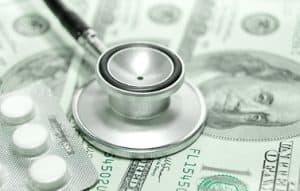
Out-of-pocket medical costs—like deductibles, doctor’s office co-pays, and prescription drugs—pushed more than 10 million Americans below the poverty line in 2015, according to the U.S. Census. So its not surprising that the leading cause of personal bankruptcy in the US is linked to medical expenses. Bankruptcy lawyers deal with doing medical bankruptcy on a daily basis. Unlike many other kind of debts, medical bills cannot be avoided and often hit people hard and cause major financial hardships.
The term “Medical Bankruptcy” can be misleading. A special type of bankruptcy that ignores other debts outside of the medical bills does not exist. Bankruptcy is not exclusive and will be reported to all of ones creditors. Filing bankruptcy however, allows general unsecured debts such as credit cards, unsecured personal loans, and medical debt to be discharged. In bankruptcy, medical bills are considered general unsecured debts just like your credit cards. This means that medical bills don’t receive priority treatment and can easily be wiped out by filing for bankruptcy.
The Kaiser Foundation released a report showing how people facing medical bankruptcy try to make ends meet. Coping mechanisms include cutting spending on food, clothing, and education; working more hours or getting a second job; drawing down on long-term savings accounts; borrowing money from friends or family; increasing credit card debt; and taking out a second mortgage. Anyone who has dealt with a long term illness, hospitalization, being underinsured or no medical coverage is aware of rising healthcare costs. Even a brief stay at the hospital has been known to create a financial burden on monthly living expenses. It is one thing to be overwhelmed in debt, but what if the debt is mostly medical related? Can bankruptcy be filed just to eliminate the medical debt?
Filing Medical Bankruptcy
You can file bankruptcy and include your medical debt, but when you file you must include all outstanding debt you owe. Debtors have been under the impression that a so called “medical bankruptcy” can be filed to eliminate medical debt. This type of bankruptcy does not exist. Chapter 7 bankruptcy allows for eligible medical debt to be discharged. Chapter 13 bankruptcy is a repayment plan that can help pay down outstanding. If you cannot settle the debt and it looks as if the creditor may pursue you for payment, then your good credit is going to take a hit anyway because a collection action will show up on your credit report. And if the provider sues you and gets a judgment, it can garnish your wages or take other collection action. I find for these reasons that bankruptcy may be a good option to get rid of the debt and get you back on the road to financial recovery.